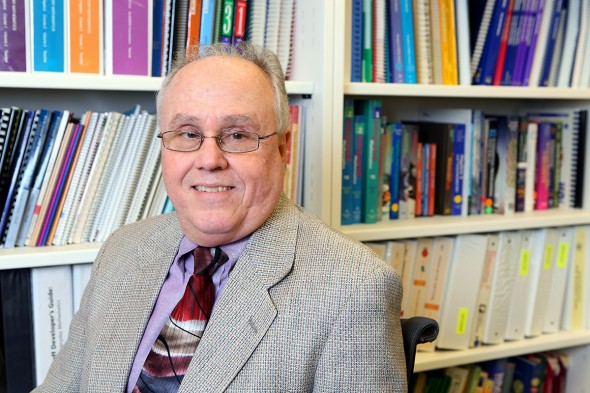Informed instruction connects theory, research and practice

“Connecting theory, research and practice requires constant effort, attention and collaboration,” says James Pellegrino. Photo: Jenny Fontaine
The University Scholar award, now in its 30th year, honors UIC faculty who are among the best in their fields — those who show superior performance and great promise in research and teaching. Winners receive $15,000 per year for three years.
He originally trained as a cognitive psychologist, but James Pellegrino’s work has evolved over four decades to focus on the learning, instruction and assessment of students from kindergarten through college.
Pellegrino, distinguished professor of psychology and education, combines cognitive science, assessment, educational technology, instructional practice and educational policy.
His goal is to better understand the nature of students’ knowledge in specific disciplines and the conditions that enhance deep understanding, inform the design of instructional practices and materials, and accurately measure what students know and don’t know.
“I’ve come to understand over a long period of time trying to work at this, that connecting theory, research and practice requires constant effort, attention and collaboration,” says Pellegrino, a distinguished professor in liberal arts and sciences.
He has led large-scale research and development projects for the National Science Foundation, the Institute of Education Sciences and the Office of Naval Research. He was the principal investigator for an NSF grant to the College Board to redesign and improve Advanced Placement science courses and assessments.
Pellegrino was elected to the National Academy of Education and named a fellow of the American Educational Research Association.
Much of his current research concerns assessment of student learning in mathematics and science. He is helping states and school districts measure the knowledge and skills students need to succeed under the Common Core State Standards and the Next Generation Science Standards.
Testing has become a national obsession that tends to distort the entire education process, he says.
“There are aspects of testing and assessment that, when done well and woven into a larger scheme that integrates curriculum, instruction and assessment in a low stakes fashion, can be very informative and beneficial,” he says.
“We just happen to have jacked this up to a high stakes game in the United States. It’s high stakes for kids, it’s high stakes for teachers and it’s high stakes for schools.”
Pellegrino and his wife, Susan Goldman, also a distinguished professor of psychology and education and LAS distinguished professor, left Vanderbilt University for UIC in 2001 to establish an interdisciplinary center that grew to become the Learning Sciences Research Institute.
“I came to UIC in part because I sensed there was an environment here with people from multiple departments, multiple disciplines, who shared common interests about studying student learning, and studying teaching and improving schools,” he says.
“That perception of the possible has been realized over the 13 years that I’ve been here.”
